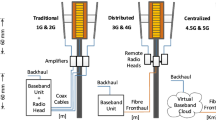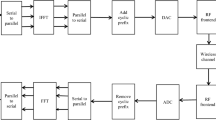Abstract
The pilot contamination problem in multi-cell multi-user massive MIMO systems is addressed in this paper. The overall performance of massive MIMO system is limited to the accuracy of the channel-state information (CSI) estimation at base station (BS). In time-division duplex systems, BS attains CSI using uplink-training sequence (TS) sent by users. The pilot contamination problem caused by using non-orthogonal TSs is the main challenge in this method. In this paper, a novel channel estimation method in the presence of pilot contamination is presented. The proposed method exploits sparse nature of the channel impulse response (CIR). Due to the pilot contamination and noise, the estimated CIR is not sparse anymore and consists of the desired and interference taps. To distinguish the desired taps from interferences, first, the initial estimation of the channel frequency response and equivalent CIR is achieved by taking EVD of received data covariance matrix. Finally, the initial estimated CIR will be modified using compressed-sensing methods. Simulation results indicate that the proposed approach achieves much better performance in terms of BER and sum-rate in comparison with the conventional methods.












Similar content being viewed by others
Notes
We have considered \( P \), \( 2P \) and \( 4P \) sparsity in simulations. The results show that the CS based algorithms have the best performance when \( 2P \) sparsity is assumed. The sparsity level was fixed at \( 2P \) in this paper.
References
Appaiah K, Ashikhmin A, Marzetta TL (2010) Pilot contamination reduction in multi-user TDD systems. In: Int. Conf. Commun., pp 1–5
Ashikhmin A, Marzetta T (2012) Pilot contamination precoding in multi-cell large scale antenna systems. In: IEEE Int. Symp. Inf. Theory Proc. (ISIT), pp 1137–1141
Chenhao Q, Lenan W (2014) Uplink channel estimation for massive MIMO systems exploring joint channel sparsity. Electron Lett 50(23):1770–1772
Chenhao Q, Yongming H, Shi J, Lenan W (2015) Sparse channel estimation based on compressed sensing for massive MIMO systems. In: Int. Conf. Commun, pp 4558–4563
Fernandes F, Ashikhmin A, Marzetta TL (2013) Inter-cell interference in noncooperative TDD large scale antenna systems. IEEE J Sel Areas Commun 31(2):192–201
Gao Z, Dai L, Dai W, Shim B, Wang Z (2016) Structured compressive sensing-based spatio-temporal joint channel estimation for FDD massive MIMO. IEEE Trans Commun 64(2):601–617
Haifan Y, Gesbert D, Filippou M, Yingzhuang L (2013) A coordinated approach to channel estimation in large-scale multiple-antenna systems. IEEE J Sel Areas Commun 31(2):264–273
Jose J, Ashikhmin A, Marzetta TL, Vishwanath S (2009) Pilot contamination problem in multi-cell TDD systems. In: IEEE Int. Symp. Inform. Theory, pp 2184–2188
Jose J, Ashikhmin A, Marzetta TL, Vishwanath S (2011) Pilot contamination and precoding in multi-cell TDD systems. IEEE Trans Wirel Commun 10(8):2640–2651
Larsson E, Edfors O, Tufvesson F, Marzetta T (2014) Massive MIMO for next generation wireless systems. IEEE Commun Mag 52(2):186–195
Li AAL, Marzetta T (2014) Interference reduction in multi-cell massive MIMO systems I: large-scale fading precoding and decoding. arXiv preprint arXiv:1411.4182
Mahyiddin WAWM, Martin PA, Smith PJ (2014) Pilot contamination reduction using time-shifted pilots in finite massive MIMO systems. In: IEEE 80th Veh. Technol. Conf., pp 1–5
Marzetta TL (2010) Noncooperative cellular wireless with unlimited numbers of base station antennas. IEEE Trans Wirel Commun 9(11):3590–3600
Masood M, Afify LH, Al-Naffouri TY (2015) Efficient coordinated recovery of sparse channels in massive MIMO. IEEE Trans Signal Process 63(1):104–118
Morales JLL, Roy S (2013) Channel estimation using time-shifted pilot sequences in non-cooperative cellular TDD networks with large antenna arrays. In: Asilomar Conf. Sig. Syst. Comput., pp 1258–1262
Muller RR, Cottatellucci L, Vehkapera M (2014) Blind pilot decontamination. IEEE J Sel Topics Signal Process 8(5):773–786
Needell D, Tropp JA (2009) CoSaMP: iterative signal recovery from incomplete and inaccurate samples. Appl Comput Harmon 26(3):301–321
Ngo HQ, Larsson EG (2012) EVD-based channel estimation in multicell multiuser MIMO systems with very large antenna arrays. In: IEEE Int. Conf. on Acoustics, Speech and Signal Proc., (ICASSP), pp 3249–3252
Nguyen SLH, Ghrayeb A (2013) Precoding for multicell massive MIMO systems with compressive rank-q channel approximation. In: IEEE 24th Int. Symp. Pers. Indoor. Mobile Radio Commun., pp 1227–1232
Peng X, Jiangzhou W, Jinkuan W, Feng Q (2014) Multi-cell H-inf precoding in Massive MIMO systems. In: IEEE Int. Conf. Commun, pp 4472–4476
Rajan ACABS (2014) Large MIMO systems. Cambridge University Press, New York, USA
Soltanolkotabi M, Soltanalian M, Amini A, Marvasti F (2009) A practical sparse channel estimation for current OFDM standards. In: Int. Conf. Telecommun., pp 217–222
Tropp JA, Gilbert AC (2007) Signal recovery from random measurements via orthogonal matching pursuit. IEEE Trans Inf Theory 53(12):4655–4666
Xu F, Xiao Y, Wang D (2014) Adaptive semi-blind channel estimation for massive MIMO systems. In: 12th Int. Conf. Sig. Process, pp 1698–1702
Zhilin C, Chenyang Y (2014) Pilot decontamination in massive MIMO systems: exploiting channel sparsity with pilot assignment. In: IEEE Global Conf. Signal. Inf. Process. (GlobalSIP), pp 637–641
Author information
Authors and Affiliations
Corresponding author
Rights and permissions
About this article
Cite this article
Kumeleh, M.H., Kenarsari, S.R. & Naeiny, M.F. Pilot Contamination Reduction Using Time-Domain Channel Sparsity in Massive MIMO-OFDM Systems. Iran J Sci Technol Trans Electr Eng 41, 255–266 (2017). https://doi.org/10.1007/s40998-017-0027-3
Received:
Accepted:
Published:
Issue Date:
DOI: https://doi.org/10.1007/s40998-017-0027-3




